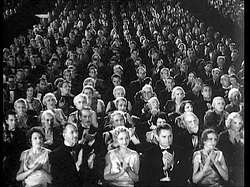 An audience hard at work.
An audience hard at work. He claims that orchestras, in their programming, sound too much like each other. He argues that decades of outreach programs have not significantly increased minority representation in orchestras or orchestral audiences. And he also suggests that orchestral managers have grown distrustful of “serious listeners” – those listeners who care about the whole width and breadth of classical music.
“Marketing material uses a hyperbolic language of emotional engagement to oversell the concert experience, implying that one has only to pull up a rug and surrender to the music. That musical appreciation takes work, and that its greatest rewards are cumulative over a lifetime rather than immediate, is not much discussed.”
I can agree with this – as far as it goes. And it’s certainly not the first time I’ve heard someone complain that, these days, the appreciation of classical music is on the wane because the necessary effort to appreciate it just isn’t being made. (On this occasion, Kennicott’s complaint is directed at the people who sell classical music, rather than the people who consume it – but whoever is to blame, it’s essentially the same concern.)
Kennicott goes on to argue that there was once a time when things were better than they are today:
“With an influx of European Jewish musicians in the 1930s and 1940s, American orchestras achieved a sophistication second to none in the Old World. The concert format became settled, audience members began to respect each other’s right to listen attentively, and (like so many other cultural institutions in America) the whole thing took on a pseudo-historical aura of sacredness.”
These silent, sophisticated listeners had evidently done their work. Yet, says Kennicott, today they have been largely replaced by a new group of listeners who haven’t really come to terms with what classical music has to offer:
“Orchestra leaders bought a lot of snake oil in hopes of democratizing the concert experience, and now they have an audience that views classical music as just one among many entertainment options, and as not very entertaining compared with bubble-gum pop and action movies.”
Okay, let’s pause for a moment to take a look at this thing called “work.” And, by way of analogy, permit me to say something about sports fans.
Serious sports fans – whether they are devoted to Canadian hockey, American baseball or British soccer – often go to great lengths to educate themselves about their preferred sport. They discuss the subject with their friends, and even with strangers in online chatrooms. They read newspapers, magazines and websites. They scrutinize statistics. They absorb and contemplate the words of professional commentators on radio and television. And when they go to the games, they go with a profound knowledge of the game being played.
All this is work – it requires sincere dedication and hours of focused, purposeful study. Yet to the sports fan, it doesn’t feel like work. If it did, most of them probably wouldn’t do it.
In other words, passion – and a sense that one’s passion is shared within a strong, like-minded community – takes much of the “work” out of work. And I’m not sure Kennicott quite grasps this. Instead of promoting passion he advocates a kind of self-effacing, monastic devotion to classical music: “ … obliging listeners to explore humility through attention to unfamiliar ideas, without regard to their own immediate need for gratification.”
Then, to drive home his point about the decline of classical music appreciation, he adds: “It has never been easier, owing to the Internet and other media, to deepen one’s knowledge and enjoyment of classical music.”
I do not believe this is true. I believe it was easier to learn about classical music back when it was a culturally vital force. In the days when many people eagerly listened to it, talked about it and studied it – for pleasure, not as a duty – it was easier to know and understand. It’s always easier to learn about things that are prominent and au courant than it is to learn about things that are widely perceived as obscure and passé.
In my opinion, the big question is this: What can we do, in the 21st century, to revive our society’s engagement with classical music as something that matters? If we can achieve that, getting people to do the work won’t be hard.
© Colin Eatock 2013
 RSS Feed
RSS Feed

